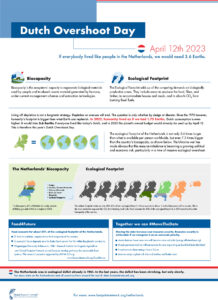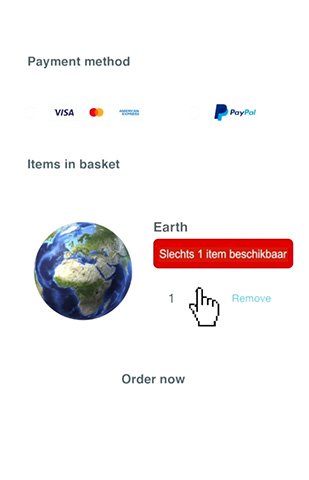Dutch climate policy moves Dutch Overshoot Day to 31 June in 2030
Current measures have significant impact, but more is needed to balance our society with the carrying capacity of the Earth
12 April 2023 – Netherlands – Today is Dutch Overshoot Day, the day when the Dutch have used the global biocapacity available for the year. In other words, if everyone on Earth lived like the Netherlands, 3.6 Earths would be needed. This over-exploitation of the planet is at the root of climate change, biodiversity- and the nitrogen-crisis. Global Footprint Network has calculated that Dutch climate policy could reduce our overshoot by 44% by 2030. This will simultaneously reduce our dependency and will push up Dutch Overshoot Day to the end of June.
A sustainable future is a secure future
The war in Ukraine and raw material supply problems during corona, make painfully clear how dependent the Netherlands is on raw materials from other countries. Disruptions to this fragile system can easily undermine the Netherlands’ economic and social stability. It is therefore only logical for the Netherlands to prepare for a world of resource scarcity and climate change.
The Footprint of the Netherlands in brief
- The Netherlands’ Ecological Footprint is more than 7 times its domestic biocapacity, and 3.6 fold the global biocapacity
- The Netherlands’ carbon Footprint is 60% of its total Footprint. Even if the target of 55% reduction by 2030 is met, CO2 emissions will remain the dominant factor of our Footprint.
- Nitrogen emissions per hectare are more than 4x higher than the European average. The nitrogen crisis caused by it, is hampering implementation of the energy transition
- The Footprint of food-related components (cropland, grazing land, and fishing grounds) makes up 24% of the total Footprint. More than 40% of it, is related to meat and dairy consumption.
Impact of Dutch Climate Policy
The Netherlands’ demand from the Earth isn’t supportable; the Dutch ecological footprint highly exceeds the country’s regenerative ability. Rob Jetten, Dutch Minister of Climate and Energy: “We are running into planetary limits in our small country. That’s why the national government is transforming our economy towards a sustainable & circular economy. Our climate policy plays a central role in this, but it is important to have a broader view. It is crucial that we learn from mistakes of the fossil past and ensure that the conversion to this new economy is in line climate, nature, human rights and the environment.”
The climate agreement and initiatives on sustainable agriculture and circular economy are reducing our footprint. The five measures with the most impact shift Dutch Overshoot Day to 31 June: taking us from 3.6 to 2 Earths.
- Climate agreement: Reduce CO2 emissions by 55% by 2030 (compared to 1990). If we achieve this, we will make a huge step: 32 days.
- Emission-free transport: If all transport is emission-free by 2030, Dutch Overshoot Day moves up by another 18 days.
- Plant-based diet. If we eat 50% less animal protein by 2030, as proposed in additional climate policies, we move the date up by almost 2 weeks.
- Circular economy: By 2030, half of the materials we use will be circular. As we use fewer raw materials, this requires less energy and emissions, moving up the Overshoot date by 10 days.
- Food waste. 50% less food waste by 2030, in line with the SDG targets, adds another 7 days.
What will it take to bring the date to 31 December
The Global Footprint Network’s analysis shows, that current measures are having a big impact, reducing our overshoot by 44%. However, more will be needed to bring our society into balance with the Earth before the effects of overshoot force us to adjust our lifestyles. Besides reducing our Footprint, an important role here is for the agricultural sector to increase the Netherlands’ bio-capacity. Growing bio-based materials and applying circular and regenerative agriculture are concrete examples of this which could be scaled.
“The implications of overshoot are particularly apparent for the Netherlands, including its nitrogen crisis and its struggles with climate policies. Circular businesses are part of the answer. These are businesses that reduce overshoot as they expand. Because of this feature, these businesses also hold the highest promise for increasing in value in times of persistent overshoot” said Mathis Wackernagel, founder of the Global Footprint Network.
Werner Schouten explains the Dutch Overshoot Day to an illustrious audience, including the Dutch King and Agricultural Minister Staghouwer (see second 25-35).
Media Contact
Joost Brinkman
joost.brinkman@darel.nl
+31 6 12 60 30 53
About the Consortium
Global Footprint Network is an international sustainability organization that is helping the world thrive within the Earth’s means and respond to climate change. Since 2003 we’ve engaged with more than 60 countries, 40 cities, and 70 global partners to deliver scientific insights that have driven high-impact policy and investment decisions. Together, we’re creating a future where all of us can thrive within the limits of our one planet. footprintnetwork.org
AVINA Stiftung is a Swiss-based non-profit foundation focused on supporting innovative research and development approaches in sustainably produced and healthy food. As a platform for pioneering minds and forward-thinking ideas, we intend to bring about sustainable change to the food system. We want to be a prime mover by facilitating opportunities to pioneers who fascinate us with their unconventional but promising mindsets. AVINA seeks, supports, and accompanies people who are dedicated to a healthier, fairer and more sustainable food system. avinastiftung.ch
The Circular Food Systems (CiFoS) team at Wageningen University aims to unravel how circular food systems can contribute to producing healthy foods for a growing population within the carrying capacity of the Earth. Within the team the visionary prize-winning Circular Food System Model was developed. This model enables to provide a much-needed food systems perspective for creating sustainable food systems. It will take us closer to new ways of feeding the world’s population, while safeguarding the planet. circularfoodsystems.org
The Research Institute of Organic Agriculture (FiBL) is one of the world’s leading institutes in the field of organic agriculture and sustainable agriculture in general. Its head offices are located in Switzerland, with branches in several countries. FiBL is committed to interdisciplinary research, innovations developed jointly with the stakeholders, solution-oriented development projects and rapid knowledge transfer from research into practice. FiBL strongly engages in the societal dialogue on our future food systems to ensure food security while staying within planetary boundaries. fibl.org
Additional Resources
- Subscribe to our newsletter to participate in the transition
- More about the Food4Future project
- Summary of the Dutch resource balance: fact sheet on the Netherlands’ Footprint and biocapacity
- Latest publication, circular food system in Nature Food
- The challenges Food4Future addresses: the 10 impossible imperatives the food systems face
- Existing possibilities in the food space and beyond
- Country-level Footprint data platform
- Global scenario calculator
- Your personal Ecological Footprint

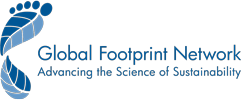
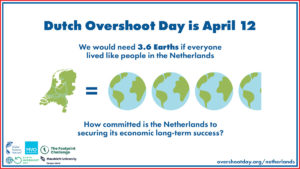 To view/download the infographic, choose file type:
To view/download the infographic, choose file type: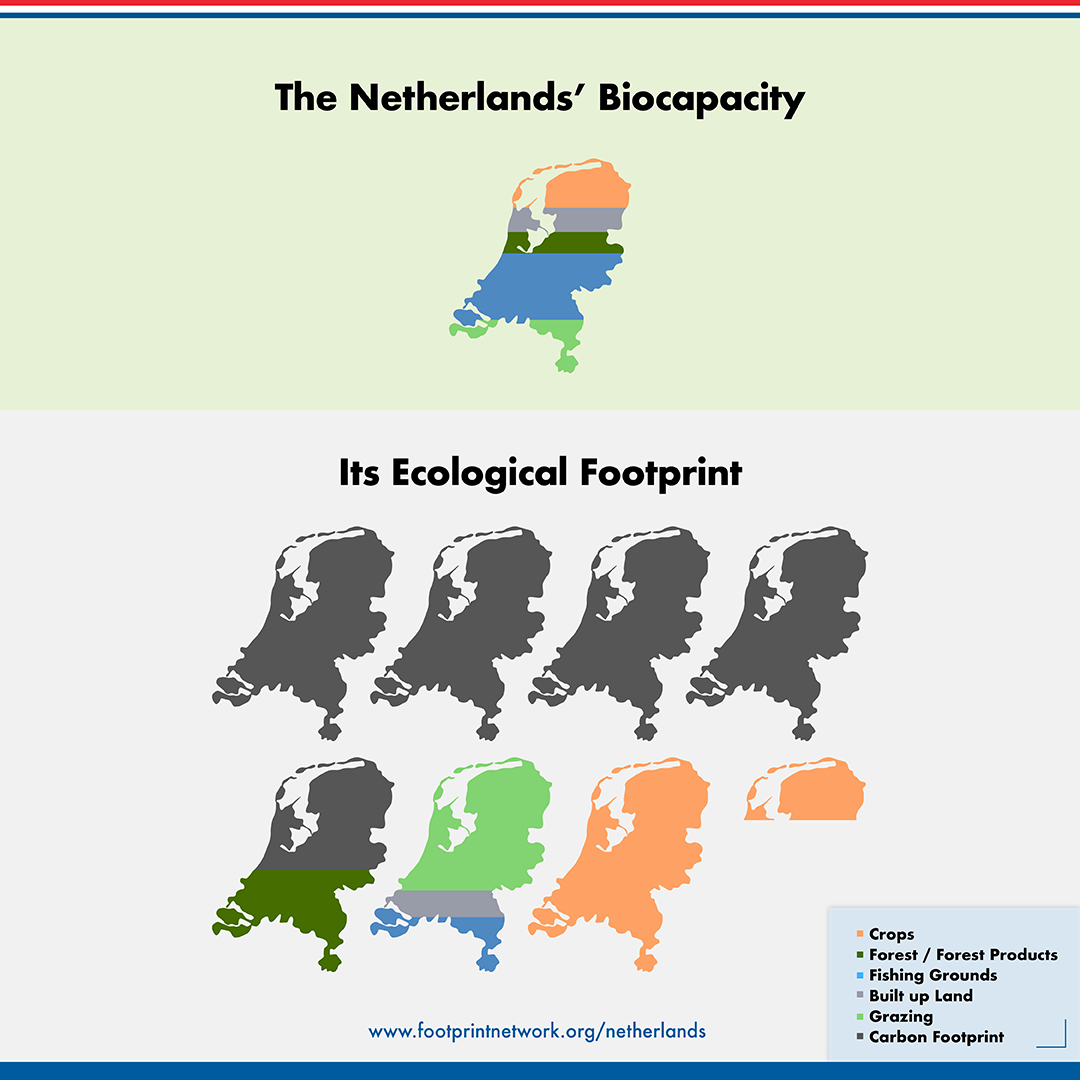 To view/download the infographic, choose file type:
To view/download the infographic, choose file type: